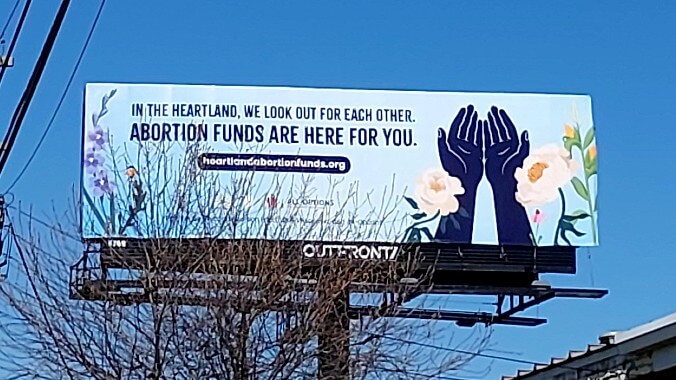This Ad Company Is Rejecting Crucial Billboards From Midwest Abortion Funds
Three funds are collaborating on an ad campaign to help abortion seekers navigate a minefield of post-Roe laws. At least one billboard company is getting in the way.
Photo: Chicago Abortion Fund (CAF), Hoosier Abortion Fund (HAF), Women’s Medical Fund AbortionPolitics
Since the Supreme Court overturned Roe v. Wade and abortion bans swept the Midwest, Illinois has become a top destination for traveling abortion patients. The state faced a 72% increase in abortions between 2020 and 2023, with out-of-state patients accounting for 68% of the increase, per Guttmacher. As a beacon for abortion access in this part of the country, an Illinois abortion fund has joined with funds from other parts of the Midwest for a billboard campaign to let the public know they still have options to access abortion care despite new challenges—but this campaign is facing significant barriers of its own.
“In the heartland, we look out for each other. Abortion funds are here for you,” reads one billboard that Chicago Abortion Fund (CAF), Hoosier Abortion Fund (HAF), and the Women’s Medical Fund (WMF) of Wisconsin submitted to Lamar Advertising as part of their multi-state campaign. But in March, the company informed the groups that their billboard was rejected, citing concerns about the legality of their work. Since August, abortion has been banned in Indiana, where HAF—a part of Indiana’s All Options reproductive justice group—operates.
But no law prohibits pregnant people from seeking the support of abortion funds, or abortion funds from disclosing the resources they provide to help people travel out-of-state for care. Even more egregious, Lamar Advertising has run billboards from anti-abortion groups trying to dissuade people from having abortions and targeting Black women with racist messaging. Meanwhile, as those billboards run, women and pregnant people in regions disproportionately affected by abortion bans are left scrambling, trying to make sense of an ever-shifting, highly confusing legal landscape.
“We’re really seeing that the numbers of people calling us have gone down significantly since the [Indiana] ban went into effect,” Parker Dockray, executive director of All Options, told Jezebel. “People don’t know they’re allowed to call somewhere for help or leave the state. It’s heartbreaking that a lot of people out there who could use our help don’t even know. People are very confused.” Those who do call HAF seeking help need substantially more financial assistance than callers did before the ban took effect, as they’re now required to travel out-of-state, take more time off work, or seek assistance with child care.
-

-

-

-

-

-

-

-

-

-

-

-

-

-

-

-

-

-

-

-

-

-

-

-

-

-

-

-

-

-

-

-

-

-

-

-

-

-

-

-








































